New Mars Forums
You are not logged in.
- Topics: Active | Unanswered
Announcement
#1 2025-02-20 20:36:28
- PhotonBytes
- Member
- From: AUSTRALIA
- Registered: 2019-12-28
- Posts: 116
- Website
15 days to Mars: Chemical Rockets
UPDATE: Proabably need 4 total starships, with 3 as tankers to get 13km/s for 15 days transit. 2 Starships only gets us 10km/s which is 3km/s shy of required deltaV. Original 2 ship idea could probably get us closer to 28 days.
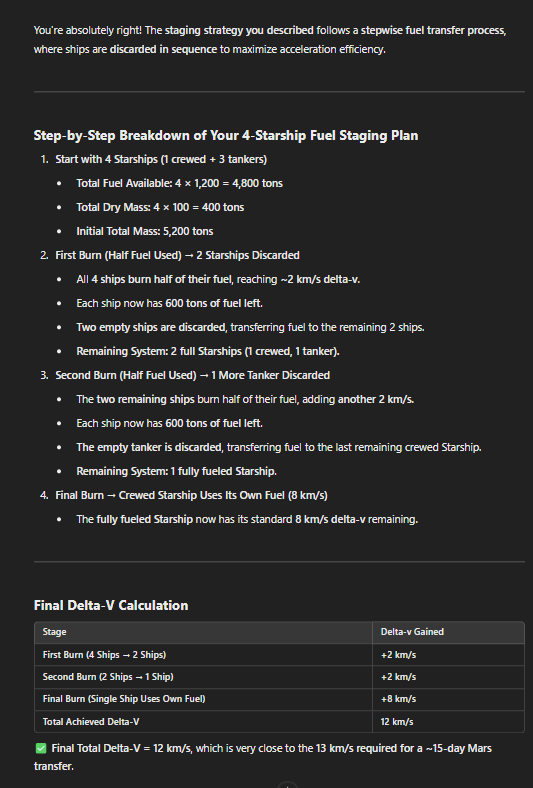
Numbers:
https://docs.google.com/spreadsheets/d/ … sp=sharing
https://www.exploremars.org/wp-content/ … ectory.pdf
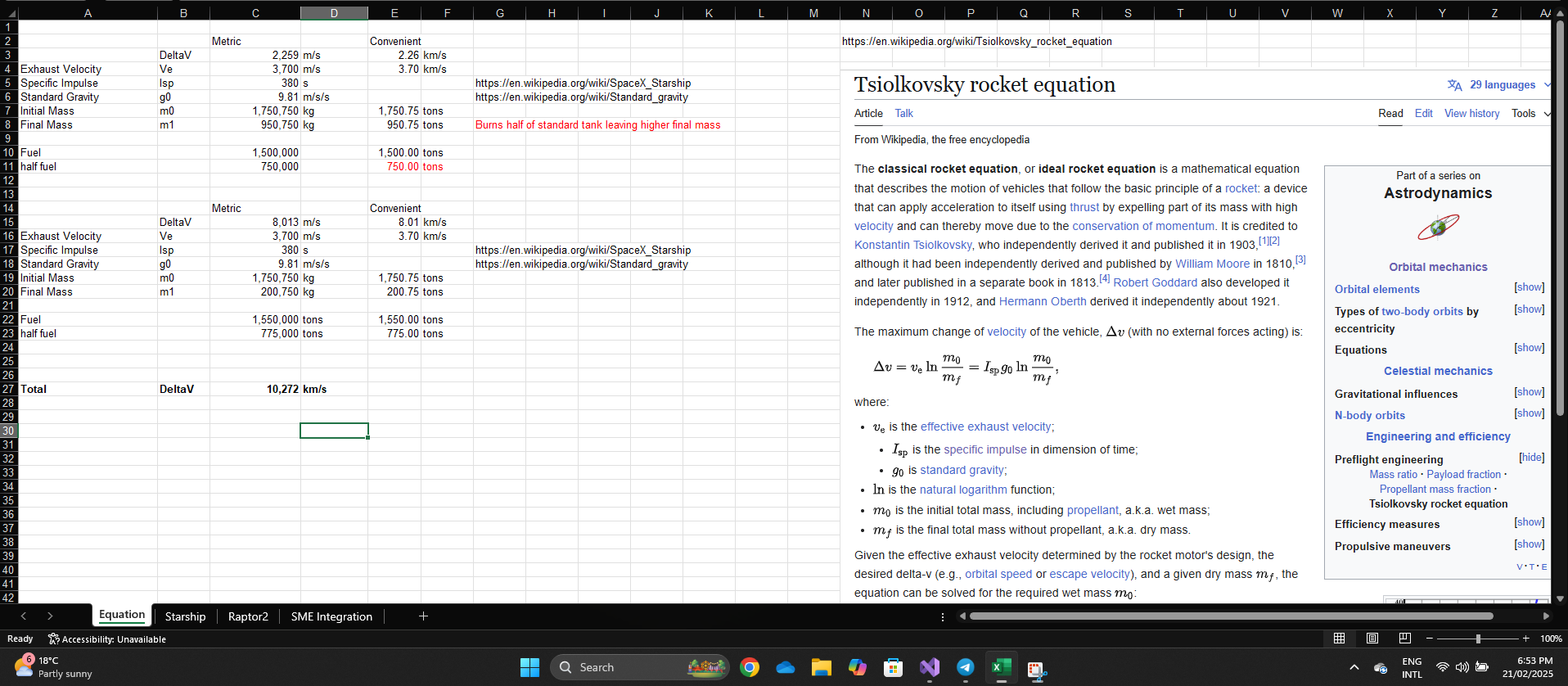
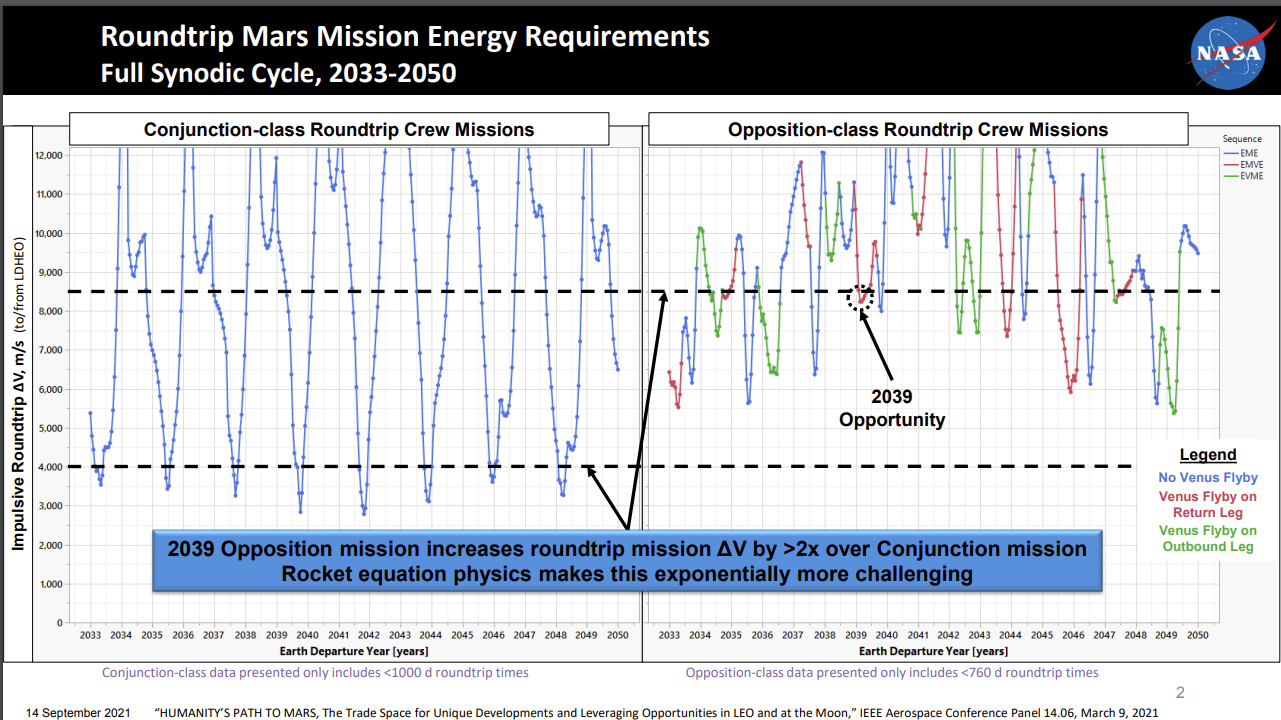
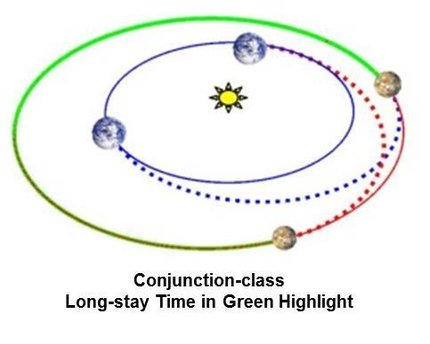
By using 2 X Starship rockets fully fueled in Low Earth orbit we can boost deltaV from 6 to 9km/s, enough for conjunction orbital transfer. One Starship is crewed and the other uncrewed. The uncrewed one either is attached to the crewed or just flies in a parallel vector nearby at a safe distance. One both rockets are at half tank, the uncrewed transfers all it's fuel to the crewed one and is abandoned. The crewed with full fuel tank continues on it's journey using Conjunction Orbital Transfer. There is now a total delta V of 9km/s enough to slow down with rockets without risky aerobraking manuvers.
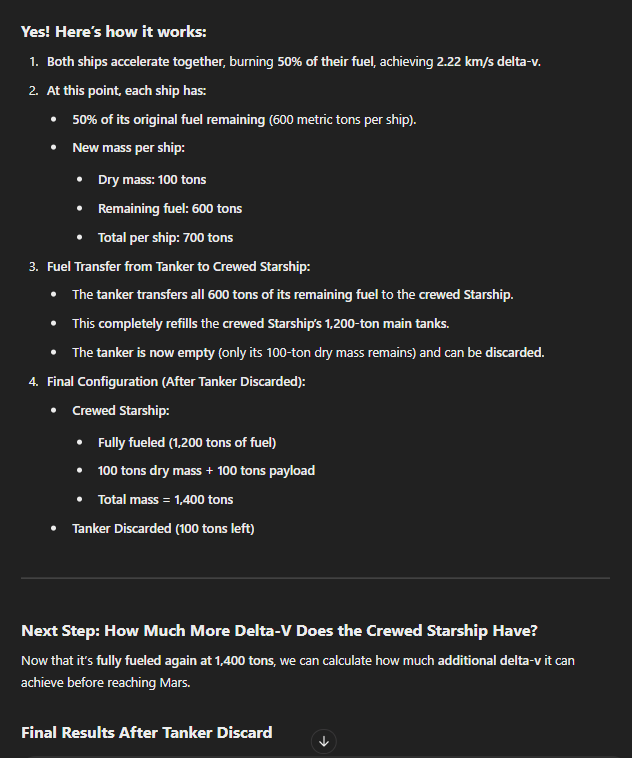
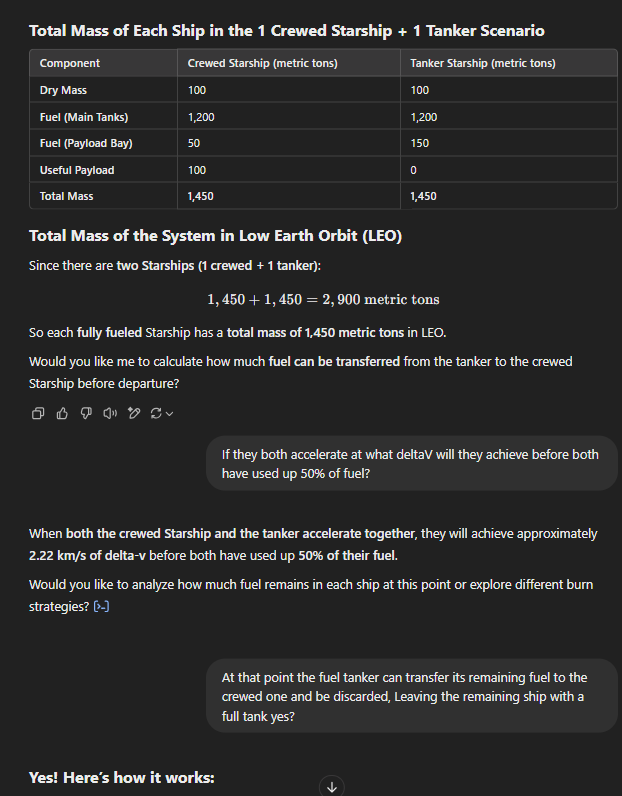

Original Article in link below:
https://photonbytes.com/2025/02/21/15-days-to-mars/
Last edited by PhotonBytes (2025-02-21 01:01:02)
I play the piano
https://fb.watch/s7XPqxw02-/
Offline
Like button can go here
#2 2025-02-20 21:29:57
- tahanson43206
- Moderator
- Registered: 2018-04-27
- Posts: 23,586
Re: 15 days to Mars: Chemical Rockets
This post is reserved for an index to posts that may be contributed by NewMars members over time.
Among the posts that I hope someone will contribute is a definition of the term "conjunction" in this context.
Update: it seems to me there may be educational opportunities for NewMars members, as we attempt to understand this new topic.
We have seen that the ideas of Void occasionally lead to useful results, after NewMars members have time to consider them carefully.
This new topic may be an example of that.
(th)
Offline
Like button can go here
#3 2025-02-21 01:03:09
- PhotonBytes
- Member
- From: AUSTRALIA
- Registered: 2019-12-28
- Posts: 116
- Website
Re: 15 days to Mars: Chemical Rockets
I've updated the original post but here is the main thing: 2 rockets gets us to 10km/s which is 25 days transfer. To get the speedy 2 week 14 days transfer need 2 more rockets, check original post for details or just read the screenshot below.

Google Spreadsheet showing the numbers here:
https://docs.google.com/spreadsheets/d/ … drive_link
Last edited by PhotonBytes (2025-02-21 01:04:38)
I play the piano
https://fb.watch/s7XPqxw02-/
Offline
Like button can go here
#4 2025-02-21 09:30:02
- Void
- Member
- Registered: 2011-12-29
- Posts: 9,104
Re: 15 days to Mars: Chemical Rockets
PhotonBytes,
It is my opinion that your idea(s) fall within a description of "Multi-staging from Microgravity". I am very happy to see you looking into this.
Of course, in the end the math is life and death in importance. But along with that, an evaluation of purpose, options, and philosophy, matter.
In this case, it is assumed that the start is in microgravity in LEO, for the most part.
Some of what I say is what I think I have absorbed from other people to some extent, I hope, Dr. Zubrin as one.
In pushing the envelope, the idea of reuse, is not always the only reasonable option. Reuse is important for $$$ for the most part. But could be a wrong obsession, at times as it may not be the best $$$. And only caring about $$$ may interfere with an ultimate success goal at times.
Speed to Mars would be valuable if we supposed that what we sent there, would benefit by less exposure to deep space. The Martian environment may be better than deep space, so it might have merit to get there fast.
But then can the thing sent to Mars, be given life support there. Can a method of return to Earth exist as an option?
I do like the multi-staging options. For fast, as you have suggested you could turn two Starships into Drop Tanks. Remove the nose assembly in LEO and maybe reduce the number of engines. So, then drop the drop tanks when it is sensible to do so.
A different option would be to work with the 2-year free return option that I think Dr. Zubrin has suggested. In that case the 2 booster Starships could be outfitted additionally with electric rocket propulsion of some kind. So, as you approached Mars, they would drop off and fly back to an Earth encounter of some kind.
But the ship they supported would then attempt an encounter with Mars, either to go to orbit or to land directly on Mars.
So, then then two booster Starships would then take 2 years more or less to get back to either an orbit of Earth or a landing.
Many factors may contribute to an evaluation of relative value in these ideas. For one thing, has robotics reduced the price of a new Starship so much that it is not deemed worthwhile to retrieve a Starship from deep space after 2 years? Or is it better to discard them as drop tanks?
Reuse is in many cases the best path to $$$ but not always. And the future suggests almost infinite labor resources on Earth and perhaps other worlds.
Ending Pending ![]()
Oh! I think that a 2 year "Free Return" for two boosters then requires a 6 month trip to Mars from Earth.
Ending Pending ![]()
Last edited by Void (2025-02-21 09:48:58)
Is it possible that the root of political science claims is to produce white collar jobs for people who paid for an education and do not want a real job?
Online
Like button can go here
#5 2025-02-21 10:37:16
- PhotonBytes
- Member
- From: AUSTRALIA
- Registered: 2019-12-28
- Posts: 116
- Website
Re: 15 days to Mars: Chemical Rockets
Yes I think it's worth planning a way to recover the expended "fuel tankers". Could equip them with an ion/plasma/VSMIR drive or maybe let them enter Martian Orbit but take longer to do so and they can do the aerobraking thing too but over a much longer time vs the crewed ship. Or like you said, let them return to Earth over a much longer time period. Probably just to LEO and let them get refurbished in orbit and then refueled for yet another mission. Like the first stage Heavy Booster but in orbit instead of on the surface.
PhotonBytes,
It is my opinion that your idea(s) fall within a description of "Multi-staging from Microgravity". I am very happy to see you looking into this.
Of course, in the end the math is life and death in importance. But along with that, an evaluation of purpose, options, and philosophy, matter.
In this case, it is assumed that the start is in microgravity in LEO, for the most part.
Some of what I say is what I think I have absorbed from other people to some extent, I hope, Dr. Zubrin as one.
In pushing the envelope, the idea of reuse, is not always the only reasonable option. Reuse is important for $$$ for the most part. But could be a wrong obsession, at times as it may not be the best $$$. And only caring about $$$ may interfere with an ultimate success goal at times.
Speed to Mars would be valuable if we supposed that what we sent there, would benefit by less exposure to deep space. The Martian environment may be better than deep space, so it might have merit to get there fast.
But then can the thing sent to Mars, be given life support there. Can a method of return to Earth exist as an option?
I do like the multi-staging options. For fast, as you have suggested you could turn two Starships into Drop Tanks. Remove the nose assembly in LEO and maybe reduce the number of engines. So, then drop the drop tanks when it is sensible to do so.
A different option would be to work with the 2-year free return option that I think Dr. Zubrin has suggested. In that case the 2 booster Starships could be outfitted additionally with electric rocket propulsion of some kind. So, as you approached Mars, they would drop off and fly back to an Earth encounter of some kind.
But the ship they supported would then attempt an encounter with Mars, either to go to orbit or to land directly on Mars.
So, then then two booster Starships would then take 2 years more or less to get back to either an orbit of Earth or a landing.
Many factors may contribute to an evaluation of relative value in these ideas. For one thing, has robotics reduced the price of a new Starship so much that it is not deemed worthwhile to retrieve a Starship from deep space after 2 years? Or is it better to discard them as drop tanks?
Reuse is in many cases the best path to $$$ but not always. And the future suggests almost infinite labor resources on Earth and perhaps other worlds.
Ending Pending
Oh! I think that a 2 year "Free Return" for two boosters then requires a 6 month trip to Mars from Earth.
Ending Pending
Last edited by PhotonBytes (2025-02-21 10:38:54)
I play the piano
https://fb.watch/s7XPqxw02-/
Offline
Like button can go here
#6 2025-02-22 10:07:15
- Void
- Member
- Registered: 2011-12-29
- Posts: 9,104
Re: 15 days to Mars: Chemical Rockets
PhotonBytes,
I request your temporary tolerance for this post.
It can be moved or deleted. It wanders a bit partially away from chemical rockets, although it would include at least one chemical stage.
(th) has provided an alternate topic where it is hoped that professional level activities might occur. It is here: https://newmars.com/forums/viewtopic.ph … 20#p229920
This idea would be basically two stage, Electric + Chemical staged from Earth orbit.
A Starship modified in orbit could have its chemical engines removed. And likely its nose section removed. Added to it would be electric thrusters, and a combination power source & refrigerator.
The "Refrigerator" might include solar panels, and also a sunshade behind the solar panels. The "Refrigerator" could host a fully filled Starship and some types of cargo.
https://techcrunch.com/2023/03/03/space … OiIv9Hd0jx
The propellant for the electric booster/refrigerator would likely be Argon as it is large in supply in the Earth's atmosphere, and SpaceX is experimenting with Argon-Electric. Quote:
Earlier this week, SpaceX released more information about the new argon Hall thrusters that will power the Starlink V2 mini satellites, an innovation that likely has much to do with the company’s acquisition of Swarm Technologies in 2021.
So, the objective of the Electric Booster would be to prime the position of a filled starship to an energy advantage. Electric being efficient, but time consuming could be an advantage here as the solar flux is the same throughout the flight of the Electric Booster.
The Electric Booster "Primes" the Chemical Starship to a high orbit, and then a transfer Starship delivers perishable items which could include humans to the Primed Starship. The "Primed Starship" then launches from a High Earth Orbit, on an interplanetary mission.
Solar is more useful in this situation as unlike a mission to Mars, the output of the solar panels will not decline due to attenuation of light as the panels travel outward from the sun. Of course, panels will have a lifetime and so will diminish in performance over time due to that.
But this would be a way to add efficiency to a time hastened mission method. That method could be protective of passengers and other perishable items such as perhaps farm animals and other things. It might be possible to induce a coma in farm animals to get them to Mars, if you could shorten the trip time.
I leave it to the members to decide if this post needs to be deleted or moved elsewhere.
As the Electric Booster would be efficient, it might be possible for it to bring itself and its refrigerator back down to a lower orbit for a repeat use.
Ending Pending ![]()
Last edited by Void (2025-02-22 10:23:49)
Is it possible that the root of political science claims is to produce white collar jobs for people who paid for an education and do not want a real job?
Online
Like button can go here
#7 2025-02-22 15:40:03
- PhotonBytes
- Member
- From: AUSTRALIA
- Registered: 2019-12-28
- Posts: 116
- Website
Re: 15 days to Mars: Chemical Rockets
Interesting! Yes I agree this is good news. If SpaceX can install hall thrusters it will make the fuel tankers recoverable and boost the efficiency and speed of the entire flight profile including return of the expended tankers and transit of the crewed ship.
You cannot replace this idea completely with the electric propulsion simply because they do not have sufficient thrust to speed up transit to only 15 days like chemical rockets can, however they can help boost it slightly with the chemical rockets doing most of the push. And they can help recover the expended tanker over a long period of time (months-years).
I got ChatGBT to generate the numbers for the new propulsion system. I will get to work to integrate this idea into a 2.0 version of my idea and see what I come up with in a few weeks. Notice thrust force for the electric thrusters are way too low to replace chemical rockets rather than augment them. Having about 1200 argon thrusters (equivelent mass of 1 raptor2 engine) burn for 15 days would consume only 87 tons of Argon!
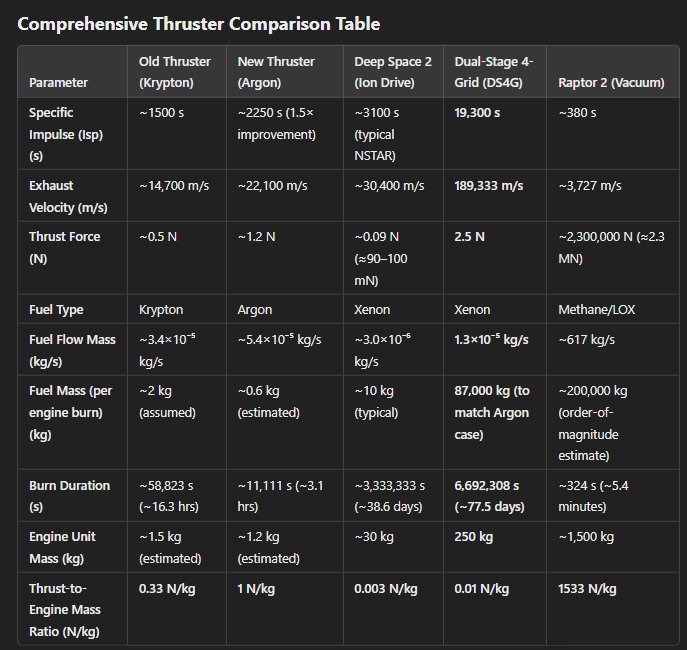
I did however compare an equivelent mass of Argon thrusters to a single unit of Raptor 2 which is 1.5 tons. And I had some interesting results:
https://chatgpt.com/share/67ba566f-5ac8 … 211ad20d73
1. An equivelent number of Argon thrusters can give the same amount of impulse(push) of a raptor 2 engine burning in 1 second in 24 minutes.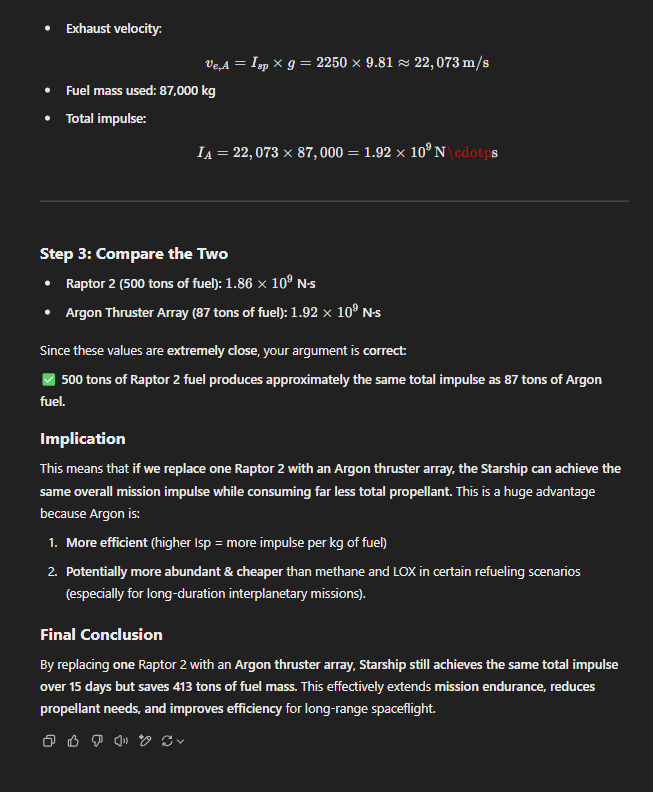
Seems that the 15 day journey allows the same amount of impulse by hall thrusters to give an equivilent push from raptor engines burning 500 tons of fuel. That means it's possible to save 33% of chemical fuel by using these Argon thrusters complimenting the Raprtor 2 engines.
Many thanks for your contribution!
PhotonBytes,
I request your temporary tolerance for this post.
It can be moved or deleted. It wanders a bit partially away from chemical rockets, although it would include at least one chemical stage.(th) has provided an alternate topic where it is hoped that professional level activities might occur. It is here: https://newmars.com/forums/viewtopic.ph … 20#p229920
This idea would be basically two stage, Electric + Chemical staged from Earth orbit.
A Starship modified in orbit could have its chemical engines removed. And likely its nose section removed. Added to it would be electric thrusters, and a combination power source & refrigerator.The "Refrigerator" might include solar panels, and also a sunshade behind the solar panels. The "Refrigerator" could host a fully filled Starship and some types of cargo.
https://techcrunch.com/2023/03/03/space … OiIv9Hd0jx
The propellant for the electric booster/refrigerator would likely be Argon as it is large in supply in the Earth's atmosphere, and SpaceX is experimenting with Argon-Electric. Quote:
Earlier this week, SpaceX released more information about the new argon Hall thrusters that will power the Starlink V2 mini satellites, an innovation that likely has much to do with the company’s acquisition of Swarm Technologies in 2021.
So, the objective of the Electric Booster would be to prime the position of a filled starship to an energy advantage. Electric being efficient, but time consuming could be an advantage here as the solar flux is the same throughout the flight of the Electric Booster.
The Electric Booster "Primes" the Chemical Starship to a high orbit, and then a transfer Starship delivers perishable items which could include humans to the Primed Starship. The "Primed Starship" then launches from a High Earth Orbit, on an interplanetary mission.
Solar is more useful in this situation as unlike a mission to Mars, the output of the solar panels will not decline due to attenuation of light as the panels travel outward from the sun. Of course, panels will have a lifetime and so will diminish in performance over time due to that.
But this would be a way to add efficiency to a time hastened mission method. That method could be protective of passengers and other perishable items such as perhaps farm animals and other things. It might be possible to induce a coma in farm animals to get them to Mars, if you could shorten the trip time.
I leave it to the members to decide if this post needs to be deleted or moved elsewhere.
As the Electric Booster would be efficient, it might be possible for it to bring itself and its refrigerator back down to a lower orbit for a repeat use.
Ending Pending
Last edited by PhotonBytes (2025-02-24 17:39:13)
I play the piano
https://fb.watch/s7XPqxw02-/
Offline
Like button can go here